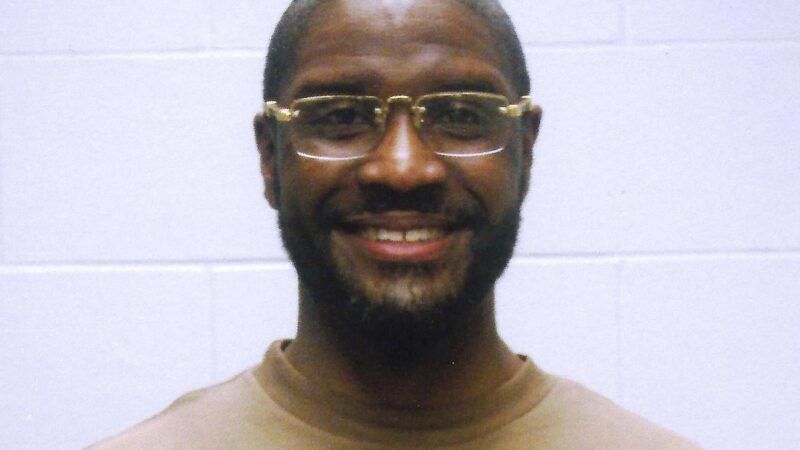No Mercy Came for Brandon Bernard and None Will Come Today for Alfred Bourgeois
Bill Barr and Donald Trump spend the end of their terms executing prisoners.

"I'm sorry," Brandon Bernard said, kicking off a three-minute apologetic speech that would be his final words. "That's the only words I can say that completely capture how I feel now and how I felt that day."
Bernard was executed at 9:27 p.m. Thursday evening at the federal prison in Terre Haute, Iniana, at the age of 40 for a crime he committed when he was 18. In 1999, Bernard, Christian Vialva (who was 19 at the time) and three teen boys carjacked Todd and Stacie Bagley in Killeen, Texas. They drove around with the couple in the trunk until Vialva shot the two of them in the head. Then Bernard set the car on fire with the bodies inside.
It was a brutal crime for which Bernard has spent the past 20 years showing nothing but remorse and serving as a model prisoner on death row. The man has become nothing at all like the likely brutal gangbanger prosecutors portrayed him as to convince jurors to sentence him to death. Subsequently five jurors have reversed their positions and said they wanted his sentence commuted, as did a former prosecutor working on the case.
Vialva was executed in September. The Supreme Court Thursday night declined to intervene in Bernard's case. Three of the justices, Stephen Breyer, Elena Kagan, and Sonia Sotomayor, said they would have granted the application to stay the execution, but they were outvoted. President Donald Trump spent Thursday evening complaining on Twitter about how the presidential election results were fraudulent and insisting that he actually won. He did not grant Bernard's request for a pardon and did not comment publicly on Bernard's execution. He has been silent on all nine federal executions that have taken place since July, when Barr restarted them. According to the Daily Beast, Trump was unmoved by heavy lobbying from the likes of Kim Kardashian, who spoke to Bernard just hours before his execution.
Robert C. Owen and John Carpenter, attorneys for Bernard, put out a statement about their client's death that concluded, "Brandon's execution is a stain on America's criminal justice system. But I pray that even in his death, Brandon will advance his commitment to helping others by moving us closer to a time when this country does not pointlessly and maliciously kill young black men who pose no threat to anyone, when we hold prosecutors to the highest standards of integrity in every case, and when our leaders exercise their moral authority where it is needed."
That Bernard's highly publicized remorse and rehabilitation failed to bring about any mercy from Trump means it's unlikely that Bourgeois' execution will be halted this evening. Bourgeois was convicted of abusing and beating his own 2-year-old daughter to death in 2002 after he lost his temper due to a potty-training accident. He was also convicted of sexually molesting her.
After Bourgeois, whose execution will be the 10th under Trump, there are still three other prisoners the Department of Justice has scheduled for execution before President-elect Joe Biden's inauguration. Lisa Montgomery, Corey Johnson, and Dustin Hicks are all scheduled to be executed between January 12 and 15, days before Biden will be sworn into office. Biden opposes the death penalty, but has come to this position only recently. Barr's execution spree has not prompted a major public response and Biden's transition team press office did not reply to a request for comment. Defense attorney David Menschel noted on Twitter Thursday night that friends had approached President Barack Obama's administration to commute Bernard's and others' death sentences and were rebuffed.
Last night, Rep. Justin Amash (L–Mich.) briefly outlined on Twitter what libertarian opposition to the death penalty looks like:
The federal government under Donald Trump has executed more individuals in recent months than had been executed in the preceding 60 years. The death penalty is inhumane and fraught with error. No government should have this power. It's past time to #AbolishTheDeathPenalty.
— Justin Amash (@justinamash) December 11, 2020
The state is not infallible. Justice isn't simple or easy, even when it feels like it (as in Bourgeois' case), and the death penalty is irreversible. Furthermore, as Bernard's case shows, the death penalty is designed to cut off the possibility of rehabilitation. Prosecutors convinced jurors to put Bernard to death by telling them that he was a violent man and that life in prison would actually only harden him and make him worse. In reality, the exact opposite happened.


Show Comments (142)